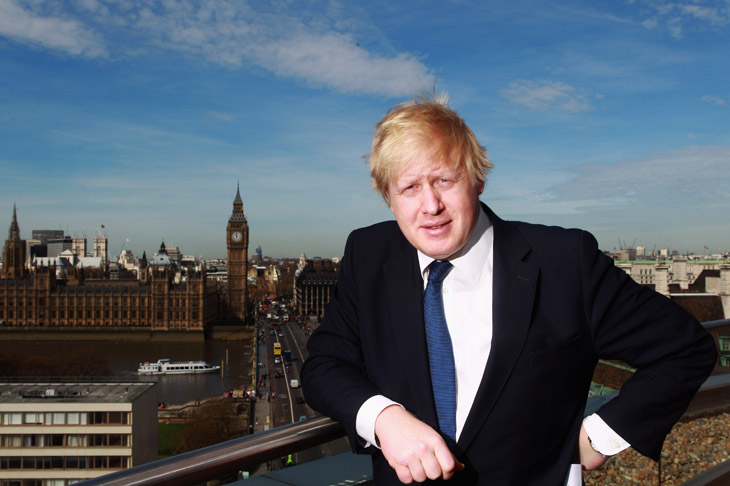Who should be housing supremo in what we all assume will be Mrs May’s new administration? Brandon Lewis and Gavin Barwell, recent junior ministers with that brief, achieved nothing — if we also assume the brief was to procure an adequate supply of new homes, in the private sector or ‘social’ one, which the ‘just about managing’ could afford. The number of affordable homes built in 2015-16 was just 32,000, half that built in the previous year and the lowest since 1992. But action is coming — apparently. ‘We will fix the broken housing market,’ declares Mrs May, mustard-keen on fixing broken markets, ‘to build a new generation of council homes right across the country.’ It was left to lieutenants to explain that there was no new target or new money behind this beyond the 40,000 homes and £1.4 billion mentioned in last year’s Autumn Statement, and no new ideas beyond unspecified reform of compulsory purchase.
She must be aware that she’ll have to do better, however, because there really is a crisis of housing affordability and availability — with knock-on effects for growth, productivity, care provision, urban crime and much else besides. What’s needed is a big beast in the perhaps unlikely mode of Harold Macmillan in the early 1950s — capable of fighting the Treasury, grabbing resources, slashing red tape and marshalling contractors and investors.
How did the initially reluctant Macmillan succeed in passing the 300,000-houses-per-year target set for him by Winston Churchill? His biographer says he deployed ‘a combination of cajolery, threat and sheer political cunning’ through well-chosen subordinates who included a shrewd industrialist (Sir Percy Mills), a dynamic civil servant (Dame Evelyn Sharp) and an ambitious junior minister (Ernest Marples). Between them they got the job done.
Who could repeat that feat today, or even achieve Jeremy Corbyn’s relatively modest target of 100,000 homes? Well, there’s one senior Tory who may not be returning to his last job, who needs to be kept busy and to notch up tangible cabinet success, who knows how to surround himself with able people, and who has experience of launching a town-sized brownfield housing scheme. He’s the former Mayor of London, and the scheme (which some say he left in a mess, but let’s hope he learned lessons) is Old Oak Common. Step up, Boris: on this occasion, the nation needs you.
Oil squeeze
The oil price blipped upwards at the beginning of the week, to $53 a barrel, after Russia and Saudi Arabia (speaking for Opec) announced an extension until next March of the agreement reached last November to cut crude oil output by 1.8 million barrels per day. That in turn provoked the FTSE100 to a new high, after energy and commodity shares rose on the news. But it will also
reinforce the current inflation trend as it swiftly feeds through to pump prices. And it’s not hard to find pundits who foresee a rise to $60 or $70 a barrel, when current, unusually large stocks of stored oil have been reduced — which means, beware: the squeeze on real incomes continues apace.
Why so improbable?
Unicorns are improbable creatures, so it’s pleasing to find that the UK has bred one called Improbable. It’s a tech venture based in Clerkenwell which has just achieved so-called ‘unicorn’ status by completing a half-billion dollar funding that gives it a total valuation of more than $1 billion — and offers a vivid example of the strengths and weaknesses of the UK digital start-up arena.
Improbable was founded by two Cambridge computer science graduates, Rob Whitehead and Indian-born Herman Narula, who share an enthusiasm for multi–player games in virtual worlds. They teamed up with ex-Goldman Sachs banker Peter Lipka to pursue the goal of ‘-seamlessly stitching together multiple servers and game engines … to power massive, persistent worlds with more players than ever before’.
If that sounds a rather trivial use of so much capital and brainpower, the point is that this complex ‘cloud-based’ simulation could also have applications for real-world decision-making in areas such as urban planning, traffic systems, power grids and healthcare provision. Perhaps we shouldn’t worry that the stitching together of multiple servers might also expose us to more hacker attacks like the one which paralysed parts of the NHS last week. But we should worry, if Improbable really represents a new frontier of computational power, that its funding has come predominantly from non-UK investors, led by Softbank of Japan (which recently bought one of our few homegrown tech giants, ARM Holdings) alongside Silicon Valley investment firm Andreessen Horowitz and Horizon Ventures from Hong Kong.
Clerkenwell and Shoreditch teem with digital boffins — but barely a bus ride away, the City of London that is the world’s greatest financial centre is strangely incapable of raising the money they need to develop their designs to commercial scale. Improbable’s founders say they’re determined to remain independent, but the natural destinations for the best British-born innovations these days are California or Asia. As for Theresa May, who shows startlingly little interest in enterprise, we may be sure this is one market she has no plans to fix.
Goodbye Trump
Trump has been removed. No, not fake news: more Orwellian parable. The Trump in question is a ram with an extravagant fleece, a petulant temper and an eye for the ewes. He’s been living in my paddock for the past few months — until last week, when he mistook the intentions of a gun-toting, rabbit–hunting neighbour, and butted him into A&E. So Trump is banished to distant pastures, to be replaced by a smaller, paler fellow who I suppose we’ll have to call Pence. I’m missing the old monster already.
Got something to add? Join the discussion and comment below.
Get 10 issues for just $10
Subscribe to The Spectator Australia today for the next 10 magazine issues, plus full online access, for just $10.
You might disagree with half of it, but you’ll enjoy reading all of it. Try your first month for free, then just $2 a week for the remainder of your first year.















Comments
Don't miss out
Join the conversation with other Spectator Australia readers. Subscribe to leave a comment.
SUBSCRIBEAlready a subscriber? Log in